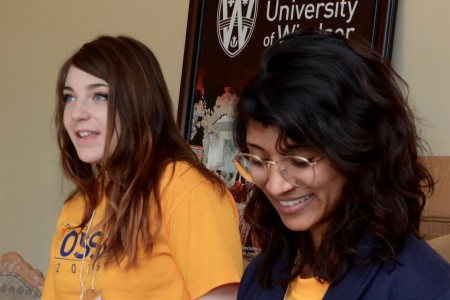
Program application process:
- For full consideration and best funding opportunities, complete your application by these dates:
- January 15 of each year for domestic (Canadian) applicants so that you may also apply for Ontario Graduate Scholarships (OGS)
- December 1 of the previous year for international applicants to get priority for Windsor's International Entrance Scholarship (we automatically nominate you). You may apply for OGS too but there is only one international for the whole university.
- After these dates we can still consider applications but without the above opportunities
- Only complete applications via the on-line application portal at the Faculty of Graduate Studies will be considered. (Please note that the separate category of "Proposed Thesis" need not be complete, just the "Study Plan/Research Interest" statement.)
- If you have technical difficulties with the application system, please seek assistance at http://ask.uwindsor.ca/
- Results communicated around March
- Program starts at the beginning of September only
Minimum admission standards include:
- Master’s degree in a discipline related to Argumentation Studies or equivalent
- Graduate grade average in the "A" range (80% or more)
Application requirements:
- All post-secondary transcripts (with official English translations where needed)
- Two letters of academic recommendation
- A short Curriculum Vitae
- A Statement of Research Interest 500-1000 words long that provides details of a proposed thesis topic or topics involving argumentation. It must also address:
- Brief highlights from your relevant experience indicating your preparation for the program
- How your interests might relate to the research programs of specific faculty members (or interdisciplinary Research Clusters).
We only admit students whose research projects are manageable given their backgrounds, the 1-2 years of training we provide in argumentation scholarship, and our available faculty; and so you must make that case in this document. We strongly recommend that you consult these faculty members and Cluster Chairs to request advice in developing your statement
- A short sample (under 6000 words) of related scholarly writing. Upload at the end of the Research Statement.
- If English is a second language (and no recent degree completed in English):
Recent TOEFL 250, IBT 100, or IELTS 7.0
Five students may be admitted each year to the whole program; and in any given year, some Research Clusters may not be admitting students.
How can I learn more about argumentation studies?
- The Windsor PhD program in Argumentation Studies is interdisciplinary and also provides a specialization in the field of argumentation studies. At least one chapter of each dissertation will engage that scholarship and the first year or so of study will prepare you to cover that angle.
- Anyone curious about the program should do their best to attend meetings of CRRAR at Windsor. For details about the current schedule and to join the email list for public events, contact crrar@uwindsor.ca.
- Argumentation studies as an academic field draws on argumentation theory that developed as a scholarly field in the 20thcentury, and Windsor’s historical strength in argumentation scholarship lies in the informal logic movement that emerged in the discipline of philosophy, which is addressed in the Stanford Encyclopedia of Philosophy across a number of articles: "argument and argumentation," “critical thinking," “informal logic,” on “fallacies,” and on "feminist perspectives on argumentation." A comprehensive overview of argumentation theory can be found in the Leddy Library, available on-line in The Handbook of Argumentation Theory (HAT). Other traditions and newer approaches -- going far beyond what HAT covers and into different empirical fields of the social sciences, and various professional fields -- can be found in the work done by some of our faculty members.
- You should consult faculty webpages in detail as part of your application to be sure that there is good fit with your interests, and your application will benefit from writing individual researchers for guidance in developing your research statement.
See our information about Funding and responses to Frequently Asked Questions in the menu above left.
